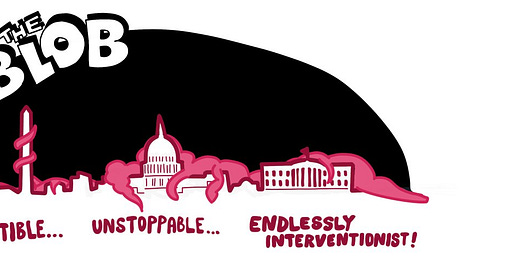Earthling: The Blob Files
Plus: Two bombshells ignored by MSM, AI anxiety, superbugs rising, and more!
God, they say, works in strange and wondrous ways. They should say that about the Blob, too. This week brought new illumination of how subtly, even invisibly, America’s hawkish foreign policy establishment can influence the minds of Americans.
The illumination comes from the latest chapter of the “Twitter Files,” written by journalist Matt Taibbi. Taibbi directs our attention to Hamilton 68, a digital “dashboard” designed to track Russian disinformation. During the Trump administration, Hamilton 68 got much media attention and played a significant role in convincing Americans of the pervasiveness of Russian influence on social media. In particular, Hamilton 68 helped convince liberals that Russia was powerfully abetting Donald Trump and various policies opposed by liberals.
Hamilton 68 thus helped prime liberals to support hawkish policies toward Russia. It may even, in some small but not trivial way, have helped reduce the political pressure Biden felt to pre-empt the Russian invasion of Ukraine through diplomacy—and may similarly reduce the pressure he now feels to push Ukraine toward peace talks.
One of Taibbi’s revelations is that Twitter head of trust and safety Yoel Roth (who has since left Twitter, and whom Elon Musk has smeared with cheap innuendo) doggedly monitored the work of Hamilton 68. Roth surmised that the dashboard was undiscerning in its identification of Russian influence, and he wanted to expose it as, more or less, a fraud.
In one email, Roth said of the 600 Russian bots that according to Hamilton 68 were waging a concerted influence campaign on Twitter: they “are neither strongly Russian nor strongly bots.” Often they were Americans with conservative political leanings, and sometimes (as in the case of Joe Lauria, editor of Consortium News), they were leftists with strong anti-Blob leanings.
In another email Roth said, “I think we need to just call this out” as “the bullshit it is.” But the call-out never came. While Roth favored publicizing Hamilton 68’s “shoddy methodology,” other Twitter execs counseled caution. Emily Horne, head of global policy communications, emailed, “We have to be careful in how much we push back on ASD publicly.” Which raises the question: What is ASD?
ASD is the Alliance for Securing Democracy, the low-profile research group that funded Hamilton 68. ASD was co-founded by influential neoconservative Jamie Fly. As Taibbi notes, its advisory council includes famed Russia hawks Bill Kristol and Michael McFaul and former heads or deputy heads of the CIA, the National Security Agency, and the Department of Homeland Security.
In short: ASD is of the Blob, by the Blob, and for the Blob. And the message Roth got from Emily Horne—who later became spokesperson for Biden’s National Security Council—was: Don’t mess with the Blob.
And he didn’t. So Hamilton 68—the online agent famous for tracking Russia’s political influence operation—continued to pursue its political influence operation.
Political scientist Norman Finkelstein—famous for being denied tenure after making controversial arguments—taped a Nonzero Podcast conversation last week to discuss his new book I’ll Burn That Bridge When I Get to It! Heretical Thoughts on Identity Politics, Cancel Culture, and Academic Freedom. The episode won’t air until next week at the earliest, but we’re giving early access to paid subscribers, who can watch or listen to the conversation here.
America’s AI arms race got serious this week as tech titans Microsoft and Google went head-to-head—unveiling, respectively, a ChatGPT-boosted version of the Bing search engine and a ChatGPT rival named Bard, which will likely add power to Google’s own search engine before long. (Bard got off to a rough start when a Google promotional video accompanying its release showed it giving the wrong answer to a question.)
Meanwhile, the AI anxiety chorus grew to include Mira Murati, Chief Technical Officer of ChatGPT developer OpenAI. In an interview with Time she encouraged regulators to get involved with AI ASAP—and encouraged input from others, including “philosophers, social scientists, artists, and people from the humanities.”
A big question, she said, is “how you govern the use of this technology globally. How do you govern the use of AI in a way that’s aligned with human values?” She noted that AI “can be misused, or it can be used by bad actors.” She didn’t provide details, so allow us: AI could help with attacks in cyberspace and could help people make chemical weapons or bioweapons.
And then there’s the question of whether AI itself could become a bad actor. Some may be alarmed to hear Murati suggest that our chance to show it who’s boss has a not-too-distant expiration date. “This is a unique moment in time where we do have agency in how it shapes society,” she said.
When asked to name a movie she found meaningful, Murati chose, perhaps ominously, 2001: A Space Odyssey.
Legendary investigative reporter Seymour Hersh made his Substack debut this week with an article asserting that the US was responsible for the sabotaging of the Nord Stream 1 and Nord Stream 2 pipelines last year. Citing an anonymous source “with direct knowledge of the operational planning,” Hersh says that navy divers planted remote-controlled explosives along the undersea natural gas conduits months before the detonation in September.
Some observers have long considered the Biden administration a leading suspect in the bombing of the Russia-to-Germany pipelines, noting, for example, that:








